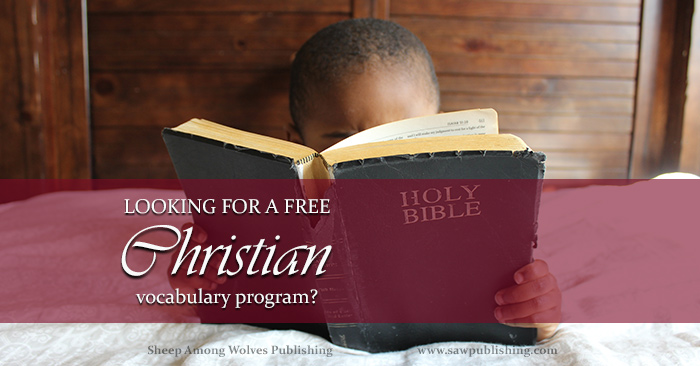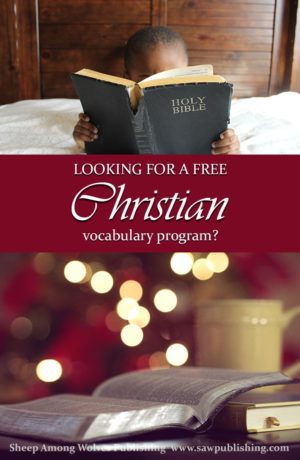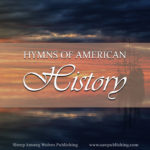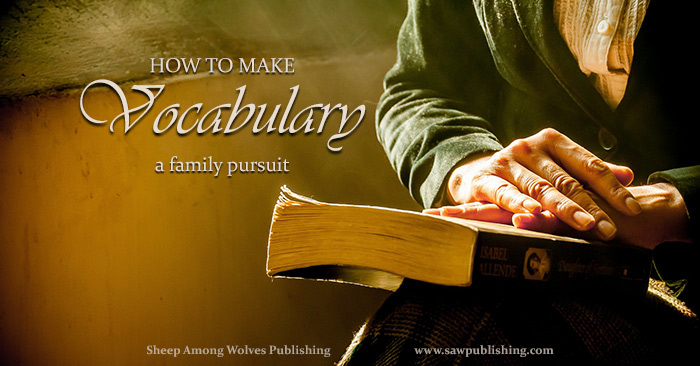Are You Looking for a FREE Christian Vocabulary Program?
 Are you looking for a Christian vocabulary program to boost your child’s English? As homeschoolers, we naturally take a personal interest in our children’s academic success. We picture raising mathematical geniuses, and literary geniuses, and geniuses in whatever we are teaching them.
Are you looking for a Christian vocabulary program to boost your child’s English? As homeschoolers, we naturally take a personal interest in our children’s academic success. We picture raising mathematical geniuses, and literary geniuses, and geniuses in whatever we are teaching them.
While we maybe realize that not all of us will end up with children who are quite as brilliant as all that, we expect at least to produce well-rounded, intelligent citizens, who will be able to hold their own in any normal situation.
So we all understand the value of a good vocabulary.
But how, exactly, do we go about teaching it? What methods are we going to employ in order to ensure that our children build a strong vocabulary?
Sheep Among Wolves’ Word of the Week Program is designed to help you in your quest!
 Building Vocabulary through Good Examples
Building Vocabulary through Good Examples
The Word of the Week (WOW) course is built around SAW Publishing’s standard of good books.
When we use the term good, we mean that a book is helpful and not harmful in a spiritual sense, and that it leads us toward good while not increasing our knowledge of evil.
The WOW course is built around some of the best literature available in this respect—Bible verses and classic hymns. This allows students to build vocabulary through positive examples that will lead them closer to God.
Building Vocabulary through Great Literature
WOW is also built around our standard of great books.
Our definition of great describes books that are well-written from a literary perspective. This includes skillful development of content and ideas, and a good command of language and expression.
The hymns and Bible verses which form the basis of WOW are also some of the greatest literature available. That’s what makes them such a great place to start expanding a child’s vocabulary!
What Does A WOW Lesson Look Like?
Each WOW lesson follows the same simple format, and includes:
- Webster’s Original 1828 Dictionary Definition—usually reprinted in its entirety. Some entries have been slightly edited to ensure child-friendly content, or to eliminate material unnecessary to the course (Webster occasionally offers 40 or more definitions of a single word).
- Short Definition Summary for Easy Reference—condensed from Webster’s 1828 Dictionary.
- Scripture Memory Verse(s)—highlighting the week’s word. All scripture passages are taken from the KJV.
- Classic Hymn Verse(s)—highlighting the week’s word. One or more stanzas are included in the body of the lesson. For those who wish to use the whole hymn, the full text as well as downloadable sheet music and audio recordings are available for each hymn at www.hymntime.com.
- Examples from Daily Life—encouraging students to use new vocabulary (written in the form of a continuing story).
- Full Colour Image—created from the paintings of past generations, and including the short definition and memory verse. Perfect for flashcards and posters. Available in both high and low resolution.
- Bonus Activity—providing extra material to reinforce new words/concepts, encourage further research, or offer additional information.
Each lesson is provided in PDF format, and comes weekly by email.
Word of the Week is a free Christian vocabulary program that first ran in the fall of 2016, and was a real-time course sent out every Monday to subscribers. Users who signed up after the starting date received links to the previous lessons, and were then added to the list.
We have since upgraded the system so that all users will begin the course with lesson one, regardless of when they sign up. This makes it easier for subscribers to derive maximum benefit from the course.
Are You Looking for a FREE Christian Vocabulary Program?
Come to think of it, I think there are probably very few of us who are actually going to raise literary geniuses. Geniuses just aren’t that common, I guess.
But I think we all have the opportunity to develop children who understand a broad range of vocabulary and can use it in appropriate situations. When we start them young enough, it won’t be that hard to do, either.
So let’s invest in our children—and in their vocabulary—so that we can equip them to be effective in choosing—and using—the words they need in every situation.
If you would like to sign up to receive the weekly WOW email, click on the sign-up button below.
Are you wondering how to use WOW with a group of students who aren’t all the same age? Check out our post:
You might also enjoy:

Are you looking for a Christian high school poetry course, that combines a high standard of literary excellence with a strong commitment to Christ-centred content?

Are you interested in adding hymns to your history course? SAW Publishing’s Hymns of American History is the perfect resource.

Does it really make sense to read the same book twice? Should we encourage our children to seek new books, or to re-read the ones they already have?

